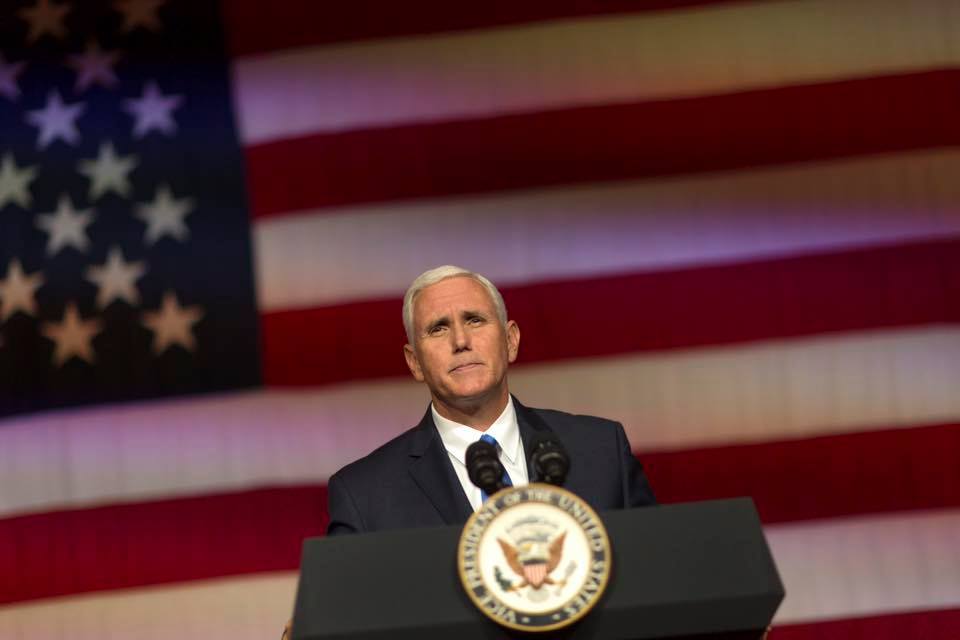Canada News
Trade war between U.S., China shows no sign of abating amid tough talk at APEC

“China has taken advantage of the United States for many, many years and those days are over,” Pence said. (File Photo: Vice President Mike Pence/Facebook)
PORT MORESBY, Papua New Guinea — Leaders from the world’s two biggest economies exchanged tough language at this summit of Pacific Rim countries as their trade war showed no signs of abating amidst a larger struggle for influence in the region.
United States Vice-President Mike Pence told a gathering of business leaders at the Asia Pacific Economic Co-operation summit that there would be no backing down from tariffs until China changed its ways.
“China has taken advantage of the United States for many, many years and those days are over,” Pence said.
The Trump administration has levelled tariffs on US$250 billion in goods from China, over complaints of deep state subsidies for businesses and intellectual property theft.
President Donald Trump mused Friday that he may not have to forge ahead with tariffs on remaining Chinese imports, suggesting the two sides were in sight of ending the dispute.
Speaking just before Pence, Chinese President Xi Jinping called trade protectionism a short-sighted policy doomed to fail. And he made a call for greater consultation to resolve any issue.
“History has shown that confrontation, whether in the form of a cold war, a hot war or a trade war, will produce no winners,” he said.
The tit-for-tat speeches on the first day of the APEC leaders summit, bringing together 21 countries that account for 60 per cent of the world’s economy, framed different visions for the world as Pence looked to make allies like Canada pick sides in the battle for world influence.
There are no plans at the moment for Prime Minister Justin Trudeau to have a one-on-one meeting with Xi, though he could bump into his Chinese counterpart in the hallways of the busy summit.
Trudeau met with Chinese Premier Li Keqiang on Wednesday in Singapore. Trudeau’s office said the two expressed a consensus about the need for reforms to the World Trade Organization, a group Trump dislikes.
Reforms to the world’s trade referee are on the agenda for this APEC meeting in Papua New Guinea, the poorest member of APEC that received millions in financial help from China and Australia to put on the summit.
China’s influence can be seen around the island nation’s capital.
Outside a newly opened hotel which hosted Trudeau’s first meeting of the day was a fence covered in a red sign with yellow writing promoting Xi’s “one-belt, one-road” project to expand trade routes around Asia. The project could take decades to complete, cost trillions and was harshly criticized by Pence and Australian Prime Minister Scott Morrison, who Trudeau will meet Sunday.
“If it succeeds…China will definitely be a world power even more than it currently is,” said Lorna Wright, executive director of the Centre for Global Enterprise at York University’s Schulich School of Business.
China has spent millions in the host country to help it prepare for the summit, looking to gain some leverage over the island’s energy resources.
“They (China) are looking at creating long-term deals and guarantees with these smaller countries to extend their own commercial, military and hegemonic interest,” said Shuvaloy Majumdar with the Macdonald-Laurier Institute, and a former Conservative government policy advisor.
The country already has one liquefied natural gas pipeline, and there are plans for a second development not far from the capital to tap a reserve originally found by a Canadian company.
LNG exports are a key contributor to the island’s economy and locals involved in projects expect to ship more of the product to Asian markets, including China.
Trudeau met with the leaders from the Pacific island nations on Saturday and spoke about funding infrastructure resilient to the effects of climate change.
“The opportunity that Canada takes very seriously to work with you on the very specific challenges facing small island developing states, the importance of capital flows and investments in infrastructure, are things that we are happy to sit down with you about,” Trudeau said at the start of the meeting.
Baron Waqa, president of Nauru, told Trudeau that tsunamis, earthquakes and cyclones have created enormous losses for the economies of smaller island states, while a rising sea level shrinks their territory and increases water salinity that effects their food security.
Trudeau said the island leaders want to frame themselves as key players in the Pacific region — both environmentally and economically.
“It is a powerful narrative which we frame and the perception and perspective of our region, away from the enduring narrative of small, isolated and fragile to that of large, connected and strategically important ocean continent,” Waqa said.





















